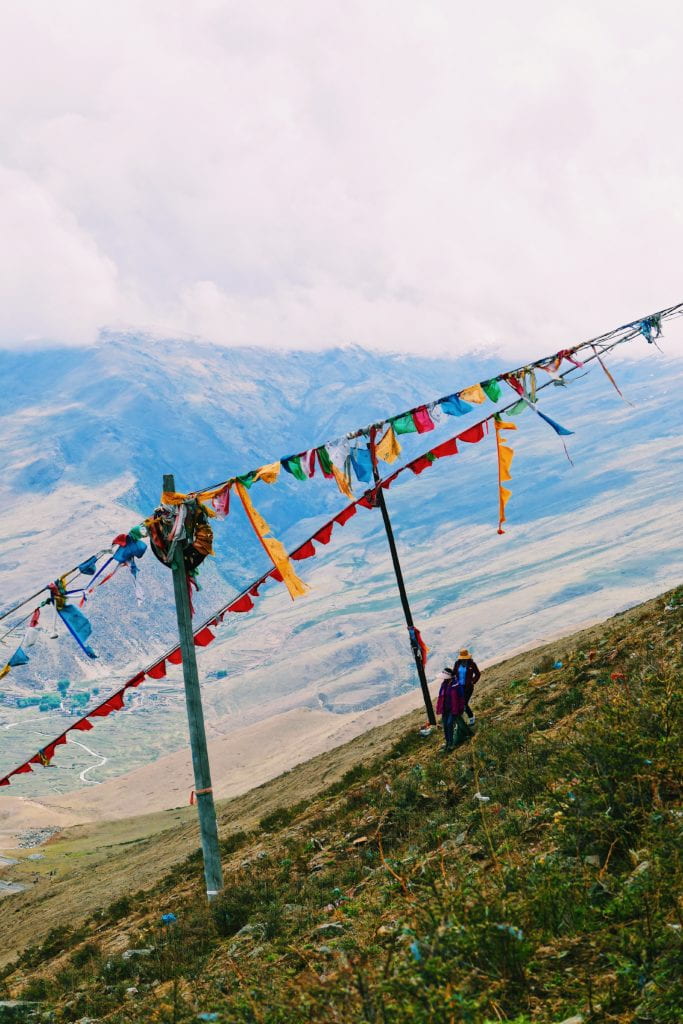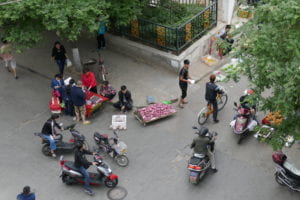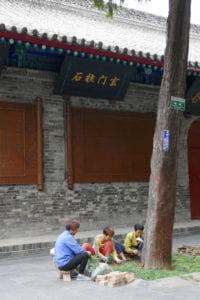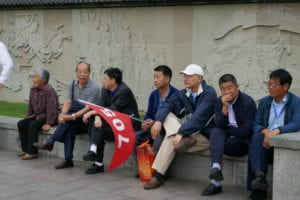What is a life well lived (and some notes on travel).
(Warning: long post ahead)
The 10th Panchen Lama did not live a good life. Not only did he spend 18 years (more than a third of his life) in prison or under house arrest, he was once subjected to the disdain and ridicule of the Tibetan people, was publicly humiliated and stripped of all authority by the Chinese government, and was said to have been subjected to severe beatings and struggle sessions. Yet, in spite of the risk of alienation by both the Chinese government and the Tibetan people, he had always stayed true to his values and fought for what he believed to be right – instead of hiding in exile in India, he risked the condemnation of the Tibetan people and publicly supported the Chinese government in order to gain political power to stand up for the rights of the Tibetans; he most famously wrote the 70,000 Character Petition denouncing the abusive actions of the Chinese government on Tibetans, resulting in his imprisonment; he unwaveringly worked to improve the lives of the Tibetan people even after his release. Therefore, although his life was not one of comfort or bliss, many can still say that he had lived his life meaningfully – and thus had lived it well – for he had stayed true to himself.
The example of the 10th Panchen Lama highlights the distinction between a ‘good life’ and a ‘well-lived life’, which Zi Gi has previously called attention to in her Day 7 reflection, where she mentions that while the former is a life of comfort, the latter involves risk-taking and challenging oneself. For me, however, it is a little more specific – in a well-lived life, one should challenge oneself not merely for the sake of doing so, but rather in order to stay true to and act in accordance with one’s values, beliefs and ideals even when circumstances may try to prevent them from doing so. This is because I believe that for someone to truly live life well, one must first be able to create one’s own meaning in what is an inherently meaningless life and thereby act on this meaning – and this meaning can only be derived if one is aware of the values, beliefs and ideals that one holds important. Therefore, a well-lived life must also encompass the discovery of the said values, beliefs and ideals through life experience and constant reflection. Only by reflecting on one’s life experiences can one uncover what speaks true to both one’s heart and one’s mind amidst the clutter and noise of others around them. As such, my version of a well-lived life can be condensed into three necessary aspects:
- Experience
- Reflection/Introspection
- Choice (to act according to one’s beliefs)
Ultimately, underlying these three aspects is the notion that the development of one’s own values, beliefs and ideals forms the basis of the well-lived life – it seems logical to me that one can only derive true meaning for one’s own life if one is able to discern what he/she wants from what others might want for him/her.
As a result, religion has always been a perplexity to me. On one hand, I have my reservations about religion because of my reluctance to accept a way of living that has been dictated by something or someone else, according to the moral standards set by someone else. This seems to me to be directly opposed to a well-lived life. Moreover, the religious live not only according to the standards and ideas set by someone else, but according to the standards and ideas set by someone else whose existence is itself an uncertainty. For me, this is beyond comprehension – why would anyone choose to believe so absolutely in something that no one can know for sure is real or right? Yet, on the other hand, my inability to comprehend also brings about admiration for those whose faith is strong – to some degree, I respect them for being able to believe in something so greatly that their faith remains strong even when faced by skeptics. Furthermore, I cannot deny the benefits that religion has brought to many. Reconciling this incongruity – that religion is to me both irrational and admirable – was therefore my prime motivation for this travel fellowship.
In Lhasa, I once again faced the contrasting irrationality and beauty of faith. While in Chongqing, Xi’an and Chengdu we had visited temples and observed temple-goers carrying out their rituals, it was only in Lhasa that we witnessed Buddhism and religion at its most extreme. Individuals there not just incorporate Buddhism in their everyday life, but also wholeheartedly perform what they believe to be their duty, even if it means personal sacrifice: under the scorching sun they perform physically exhausting koras, full-body prostrations and climb hills to put up prayer flags; despite struggling to make ends meet themselves they still meticulously place donations in every single donation box in each temple they visit; whenever they can afford the time, they count their prayer beads; as a tradition, each family sends one child to the monastery to ensure the perpetuation of Buddhism in their society. The resilience of the Tibetan community and belief, which has persisted in spite of the Chinese government’s overwhelming power against them, is testimony to the belief and strength of each of these individuals. Because of that, it is impossible not to appreciate the beauty of Tibetan Buddhism and the significance it holds for the Tibetan community (as I have mentioned in my Tibet Reflection).
However, it is also difficult not to look at these practices with a critical eye. Our guide, Thirley, shared stories about magical omniscient lakes, reincarnation, and spirits. Many of these stories we listened to intently, with interest though not without skepticism. While in many religions like Christianity and Islam, we are often told not to take religious texts and stories literally, this was not the case for the stories Thirley had shared – they are true, Thirley had insisted, because these are the personal experiences of himself and the people he knows. But how can we accept these stories that defy our knowledge of science solely on the basis that it was someone else’s personal account? (What would our SI profs say?) Following this line of thought, it becomes difficult to comprehend how Tibetans could do so much for a belief that has been founded on such myths. Think about the up to 4000kg gold stupas that have been built with the accumulated donations of the Tibetan people just to honour a dead Lama – such a practice seems unnecessarily superfluous, especially in a region where poverty, freedom, autonomy and human rights is still a big issue; the money used to build these stupas could have gone to so many other causes that would probably have had a more tangible impact on their quality of life, yet they had not seen this as an option.
Still, it feels uncomfortable for me to judge the Tibetan’s practices as irrational. After all, who am I to deem that the spiritual, psychological and social effects of religion have less value than tangible improvements in, say, education and freedom to the Tibetans? In doing so, am I not imposing my own beliefs, values and ideals on others? While the tangible improvements would make their lives better and more comfortable, what if it is still their religion that Tibetans value more, and it is thus their religious practices that will grant them a more ‘well-lived life’? Yet, I cannot help but also question: but what if the Tibetans only value their religion because, having not experienced any other opposing lifestyle, they do not know any better? Is it really that wrong of me to question their choices when those choices are very likely based on a ‘false’ belief? What if they are actually living a false, self-deceiving ‘well-lived life’?
I was therefore faced with another paradox. On one hand, people should have the freedom to choose how best to live their life and I am in no place to make judgements on that; on the other hand, what if what they believe in is absolutely false? In that case, what I am doing would not be making judgements but rather just stating an absolute truth for their sake.
Unexpectedly, it was the Jinsha Site Museum that resolved my conflict. At the Jinsha Site Museum, we were introduced to what is now an official symbol of China’s cultural heritage: a gold ornament with an openwork design of the sun surrounded by immortal birds. The design symbolizes the ancient Shu people’s belief that the sun’s rising and setting was attributed to immortal birds carrying the sun up and down at dawn and dusk every day. Since the sun did not have wings to fly by itself and the only things that people knew could move high up in the sky were things with wings, this was the most obvious and parsimonious explanation to them. As “enlightened” people who now (arguably) know better, we might find this explanation and its derivation absurdly naïve. Yet, the ancient Shu people had believed in it so ardently that these immortal birds even formed the basis of a religion for them. Or, perhaps the ancient Shu people did not think that their explanation of the sunsets and sunrises was right and merely thought of it as a legend – after all, as atheists and even today’s believers of God might agree, it is an unsupported hypothesis with no real scientific proof of the existence of an immortal bird. But they had chosen to settle with an explanation and way of thinking that they could be personally satisfied with and had built something out of that. After all, the explanation of the sun’s movement was not their only attempt at deconstructing universal phenomena. The ancient Shu civilization had also developed many other primitive ideology, traditions and technology that have had extensive influence on later Chinese and East Asian civilisations. It was, ultimately, a civilisation in which its people had believed in certain ideals and acted according to those beliefs, and therefore a civilisation that had flourished.
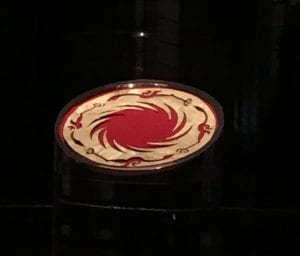
Ornament (mentioned above) in Jinsha Site Museum, Chengdu
So, who’s to say that life cannot be well-lived or meaningful when the meaning is based on something false? The ancient Shu people had still served themselves and others meaningfully with their own (mostly false) notions of the universe. Similarly, rather than always insisting on the absolute truth, it might be better to live life in a way that is personally meaningful and valuable (even if a delusion), as long as it speaks true to oneself and serves oneself and others meaningfully – as religion does for many. As for people like me, if religion is not what is personally meaningful, then so be it.
In the weeks that followed our travels in China, I watched plenty of dramas to procrastinate writing this piece of reflection (oops). In one of them, the main character reflects on the past few years in a monologue, expressing that many of her actions have led to unintended disastrous consequences. But when asked whether she regrets them, she steadfastly declares that although some of her decisions have ended up being mistakes because of the disastrous consequences, she has never regretted any of them because she could ‘see her heart’. This statement hit me hard: perhaps, at the end of the day, the outcome is less than desirable – to use an extreme example, if the Haw Par Villa’s Ten Courts of Hell were true, then many of us might face horrendous consequences for not abiding by the moral standards of old Chinese folklore – but in the end, it would probably be more regrettable if we had chosen to disregard our own values and beliefs, for that would mean dismissing ourselves, never living in the moment, and never being truly content with whatever we have done in life. And that, probably, would not be a well-lived life. 🙂
This piece has been long enough, but I have some words about travel:
Travelling is not exactly a novel experience for me – my parents love to travel, and I am fairly well-travelled for my age. But the travel fellowship introduced a whole new way of travelling to me. It prompted me to reflect on the things I saw, urged me to challenge my pre-existing notions, and pushed me to probe deeper beyond what I saw on the surface to appreciate the beauty that lay beyond the aesthetics. The Jokhang temple, for example, is not just one of the many temples in Lhasa; it is also the believers who offer donations and perform the kora around it, the thought and sincerity into designing the temple, and the sacred Jowo statue that, having been restored and returned to Tibet after decades of being lost, still bolsters the hearts of the Tibetans. Likewise, Mount Emei is not just about its Golden Summit and Buddhist temples; it is the common experience of the fellow mountain climbers who cheer each other on, the shared moment of awe and humility upon witnessing a beautiful sunrise, the sacredness of the mountain on which the first Buddhist temple in China was built. In the eyes of an inquisitive traveller, a city, a temple, a lake – they all become transformed into something peculiar, something with character, something with a meaning and purpose that transcends its physical existence.
The eyes of a traveller are therefore vastly different from the seasoned eyes of a local or a resident. The local recognises his surroundings as an everyday routine – so much so that where he is, the sights he sees, and the conversations he overhears barely register. What’s on his mind are often the hassles of everyday life. A traveller, on the other hand, finds himself in an unfamiliar setting, surrounded by unfamiliar people and culture, and outside of his daily routine. As a result, his mind is more alert but his heart more relaxed – in this new environment he is more aware and sensitive to what is going on around him, and he is able to let go of the tediousness and drab of the everyday. With an untroubled heart, he learns to recognise and appreciate the values and ideals embodied in the things he sees, thereby learning about himself and his values. This is what, I believe, made me more open to the things I saw during the travel fellowship, and thus also what brought about the feelings of wonder I acquired when travelling, such that I could even look at what I originally thought of as the tedious everyday life with newfound appreciation.
- Shots of the everyday in Xi’an
As such, travelling is not just an activity, but rather a mindset. The spirit of travelling can and should be incorporated in our everyday lives, for it keeps us inspired and introspective. It is therefore also a possible approach to the well-lived life.
– Rui Qi
